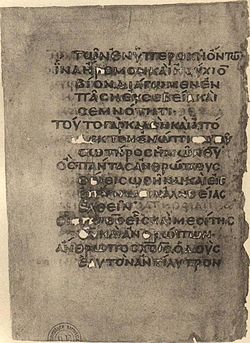2 Timothy 3
| 2 Timothy 3 | |
|---|---|

Fragments showing First Epistle to Timothy 2:2-6 on Codex Coislinianus, from ca. AD 550.
|
|
| Book | Second Epistle to Timothy |
| Bible part | New Testament |
| Order in the Bible part | 16 |
| Category | Pauline epistles |
2 Timothy 3 is the third chapter of the Second Epistle to Timothy in the New Testament of the Christian Bible. It is authored by Paul the Apostle and addressed to Saint Timothy.
This chapter can be grouped (with cross references to other parts of the Bible):
That is, all holy Scripture; for of that only the apostle is speaking; and he means the whole of it; not only the books of the Old Testament, but of the New, the greatest part of which was now written; for this second epistle to Timothy is by some thought to be the last of Paul's epistles; and this also will hold good of what was to be written; for all is inspired by God, or breathed by him: the Scriptures are the breath of God, the word of God and not men; they are "written by the Spirit", as the Syriac version renders it; or "by the Spirit of God", as the Ethiopic version. The Scriptures are here commended, from the divine authority of them; and which is attested and confirmed by various arguments; as the majesty and loftiness of their style, which in many places is inimitable by men; the sublimity of the matter contained in them, which transcends all human understanding and capacity ever to have attained unto and discovered; as the trinity of persons in the Godhead, the incarnation of Christ, the resurrection of the dead, &c. The purity and holiness of them before observed, show them to be the word of him that is of purer eyes than to behold iniquity; as also their harmony and agreement, though wrote by different persons, in different places, and ages, and at sundry times, and in divers manners; what seeming inconsistencies are observed in them may, with labour and industry, by divine assistance, be reconciled. The predictions of future events in them, as particularly concerning Josiah and Cyrus, by name, long before they were born, and especially concerning Jesus Christ, and which have had their accomplishment, and many others in the New Testament both by Christ and his apostles, are a proof that they could not be the writings of men, but must have the omniscient God for their author; the impartiality of the writers of them, in not concealing the mean extract of some of them, the sins of others before conversion, and even their sins and failings afterwards, as well as those of their nearest relations and dearest friends, strengthens the proof of their divine authority; to which may be added, the wonderful preservation of them, through all the changes and declensions of the Jewish church and state, to whom the books of the Old Testament were committed; and notwithstanding the violence and malice of Heathen persecutors, particularly Dioclesian, who sought to destroy every copy of the Scriptures, and published an edict for that purpose, and notwithstanding the numbers of heretics, and who have been in power, as also the apostasy of the church of Rome; and yet these writings have been preserved, and kept pure and incorrupt, which is not the case of other writings; nor are there any of such antiquity as the oldest of these: to which may be subjoined the testimony of God himself; his outward testimony by miracles, wrought by Moses and the prophets, concerned in the writings of the Old Testament, and by the apostles in the New; and his internal testimony, which is the efficacy of these Scriptures on the hearts of men; the reading and hearing of which, having been owned for the conversion, comfort and edification of thousands and thousands, and ten thousand times ten thousand: and
...
Wikipedia
